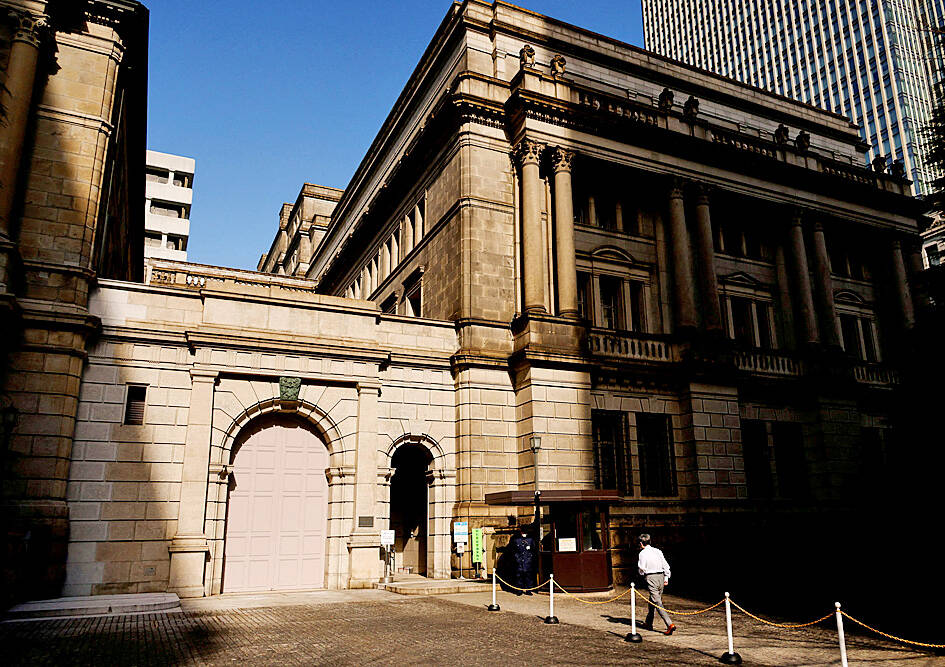The Japanese government has approached Bank of Japan (BOJ) Deputy Governor Masayoshi Amamiya about succeeding Haruhiko Kuroda at the helm of the central bank, a Nikkei report that sent the yen tumbling.
Japan’s deputy government spokesman later refuted the report, saying it was not based on fact, but the currency remained weaker suggesting that some investors believed it had substance.
Amamiya is a longtime heavyweight at the BOJ, and has been instrumental in formulating the bank’s large-scale stimulus program under Kuroda. He is seen by market players as the closest to a continuity candidate among the likely replacements.

Photo: REUTERS
The report said that the government is in the final stage of arranging its nominations, citing government and ruling coalition officials.
The central bank said it was not in a position to comment on the nomination report.
The Japanese currency fell about 1 percent past the ¥132.50 per US dollar level yesterday in early trading, its lowest since Jan. 12, on the assumption that ultra-easy monetary policy is more likely to endure if one of its architects succeeds Kuroda.

Photo: REUTERS
Japan’s benchmark 10-year yield edged higher amid a selloff in global bonds, a move that also suggests traders are reluctant to abandon their bets on BOJ policy tweaks, regardless of who becomes the next governor.
BOJ watchers are aware that local media reports on central bank personnel changes should be treated cautiously, as in the past the government went with other candidates in the face of intense criticism for leaking names before an official nomination.
Japanese Deputy Chief Cabinet Secretary Yoshihiko Isozaki said the government had not approached Amamiya, offering the strongest rebuttal of the report.
Japanese Finance Minister Shunichi Suzuki yesterday said he had not heard anything about the BOJ nomination.
Amamiya did not respond to an inquiry from reporters about whether he was approached for the role.
Japanese Prime Minister Fumio Kishida said the nomination for governor would come this month, and the government would also name its nominees for two deputy governor positions.
“The chances of rejecting current policy have become slim,” Daiwa Securities Group Inc chief economist Toru Suehiro wrote in a note.
“While the scrapping of yield curve control is possible once the stabilization of bond market is confirmed, a clear rate hike move like ending the negative rate seems unlikely,” Suerhiro said.
Should that view prevail among investors, the yen is likely to stay under pressure even if a BOJ led by Amamiya does not rule out the possibility of a policy shift.
“Amamiya is the most dovish among potential candidates,” Resona Holdings Inc chief strategist Shinsuke Kajita said in Tokyo.
“Dollar-yen may rally toward a year-to-date high of 134.77, as a sharp shift in monetary policy looks unlikely in the near term. Although even Amamiya wouldn’t be able to completely put out speculation of a future policy change,” Kajita added.
Kuroda is scheduled to step down as governor on April 8 after the longest stint running the central bank in its 140-year history. He has been instrumental in pushing one of the most ambitious monetary stimulus programs of modern times — and the 67-year-old Amamiya has been a key figure in helping design BOJ policies.
Choosing Amamiya would signal Kishida’s desire for continuity and an ability to respond to conditions with flexibility.
It is important to have stability in finance and macroeconomic policies, Japanese Deputy Chief Cabinet Secretary Seiji Kihara said on Sunday.

Intel Corp chief executive officer Lip-Bu Tan (陳立武) is expected to meet with Taiwanese suppliers next month in conjunction with the opening of the Computex Taipei trade show, supply chain sources said on Monday. The visit, the first for Tan to Taiwan since assuming his new post last month, would be aimed at enhancing Intel’s ties with suppliers in Taiwan as he attempts to help turn around the struggling US chipmaker, the sources said. Tan is to hold a banquet to celebrate Intel’s 40-year presence in Taiwan before Computex opens on May 20 and invite dozens of Taiwanese suppliers to exchange views

Application-specific integrated circuit designer Faraday Technology Corp (智原) yesterday said that although revenue this quarter would decline 30 percent from last quarter, it retained its full-year forecast of revenue growth of 100 percent. The company attributed the quarterly drop to a slowdown in customers’ production of chips using Faraday’s advanced packaging technology. The company is still confident about its revenue growth this year, given its strong “design-win” — or the projects it won to help customers design their chips, Faraday president Steve Wang (王國雍) told an online earnings conference. “The design-win this year is better than we expected. We believe we will win

Quanta Computer Inc (廣達) chairman Barry Lam (林百里) is expected to share his views about the artificial intelligence (AI) industry’s prospects during his speech at the company’s 37th anniversary ceremony, as AI servers have become a new growth engine for the equipment manufacturing service provider. Lam’s speech is much anticipated, as Quanta has risen as one of the world’s major AI server suppliers. The company reported a 30 percent year-on-year growth in consolidated revenue to NT$1.41 trillion (US$43.35 billion) last year, thanks to fast-growing demand for servers, especially those with AI capabilities. The company told investors in November last year that

Power supply and electronic components maker Delta Electronics Inc (台達電) yesterday said it plans to ship its new 1 megawatt charging systems for electric trucks and buses in the first half of next year at the earliest. The new charging piles, which deliver up to 1 megawatt of charging power, are designed for heavy-duty electric vehicles, and support a maximum current of 1,500 amperes and output of 1,250 volts, Delta said in a news release. “If everything goes smoothly, we could begin shipping those new charging systems as early as in the first half of next year,” a company official said. The new